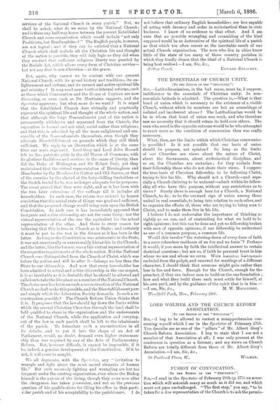THE ESSENTIALS OF CHURCH UNITY.
LTO THE EDITOR OF THE " SPECTATOR." J
SIK,—Latitudinarianism, in the bad sense, must be, I suppose,. indifference to the essentials of Christian unity. In non- essentials latitude is admitted. The question is,—What is that bond of union which is necessary to the existence of a visible Church, without which its members are but an assemblage of isolated and incoherent atoms ? The Latitudinarian would be he in whom that bond of union was weak, and who therefore- saw no necessity that it should retain its hold over others. The man who erred in the opposite extreme would be he who attempted to exact more as the condition of communion than was really necessary.
What, then, are the limits within which Christian communion is possible ? Is it not possible that our basis of union should be purpose, not opinion ? So long as the limits of our Churches are views about the nature of Christ, about the Sacraments, about ecclesiastical discipline, and so on, the Churches are sectarian ; for they exclude from their fellowship those who do not share their views. I suppose- the true basis of Christian fellowship to be following Christ, trying to live his life. Why should not a Church—and espe- cially a Church claiming to be national—admit within its fellow- ship all who have this purpose, without any restrictions as to views ? Surely there is enough here for a Church, a National Church, to do : to be the outward sign of union among those united in real essentials, to bring into relation to each other, and to organise the efforts of, those who are trying to bring men to Christ, and to make them live in his life.
I believe I do not undervalue the importance of thinking as rightly as we can, and of contending for what we hold to be right opinions ; but this can be done and yet no fellowship broken with men of opposite opinions, if our fellowship be understood as one of a common purpose, a common life.
Would this involve" the watering-down of every form of faith to a mere colourless residuum of no fire and no force "? Perhaps it would, if you mean by faith the intellectual answer to certain doctrinal questions ; but not so, if faith be personal trust in him whose we are and whom we serve. Were ;rasp/sets drasowsiss excluded from the pulpit, and reserved for meetings of a different character, I should think that sermons might gain rather than lose in fire and force. Enough for the Church, enough for the preacher, if they can induce men to build on the one foundation how and what they build there each must settle for himself, at his own peril, and by the guidance of the spirit that is in him.—


































 Previous page
Previous page